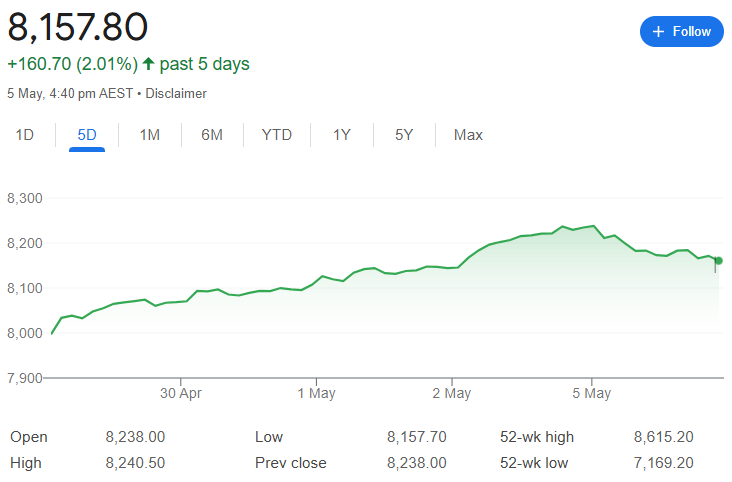| Name | Daily Close | Daily Change | Daily Change (%) |
|---|---|---|---|
| Dow | 41,218.83 | -98.6 | -0.24% |
| S&P 500 | 5,650.38 | -36.29 | -0.64% |
| Nasdaq | 17,844.24 | -133.49 | -0.74% |
| VIX | 23.64 | 0.96 | 4.23% |
| Gold | 3,342.60 | 20.3 | 0.61% |
| Oil | 57.15 | 0.02 | 0.04% |
US MARKET
Another report showing the US economy entered the trade war on solid footing pushed stocks away from session lows, while President Donald Trump suggested that his administration could strike trade deals with some countries as soon as this week. A rebound in industrial shares helped the S&P 500 erase most of a slide that earlier approached 1%. Data showing a pick-up in growth at US service providers helped assuage concerns of a recession even as the outcome of the US trade war has yet to be felt. While Trump signaled no imminent accord with China, the president said the Asian nation wants to make a deal “very badly”.
Attention will soon shift to Wednesday’s Fed decision after bond traders dialed back rate-cut bets that had steadily mounted as Trump’s trade war unleashed havoc in financial markets. As long as the economy holds firm, Jerome Powell and his colleagues can more easily justify the standing pat. Uncertainty rules amid a trade war and the ever-changing landscape of tariffs, but with the hard data on consumer spending and employment still hanging in there, the Fed will remain firmly planted on the sidelines.
The S&P 500 fell 0.1%. The Nasdaq 100 slid 0.1%. The Dow Jones Industrial Average added 0.3%. The yield on 10-year Treasuries rose six basis points to 4.36%. The Bloomberg Dollar Spot Index fell 0.1%. Oil sank as OPEC+ agreed to a bumper output increase. Taiwan’s dollar surged the most since 1988 on bets authorities might allow it to appreciate to help reach a trade deal with the US.
After piling into short-term Treasuries, anticipating the Fed would start easing policy soon to contain the fallout, traders reversed course. Two-year yields rose for a third consecutive session – the longest run since December – as traders bet policymakers will remain in wait-and-see mode until there’s more clarity on the impacts of tariffs. That said, the longer policy uncertainty persists, the greater the potential hit to economic activity.
But the tariff clock is ticking, and the Trump administration has a fairly limited window to make progress on trade deals before the economic damage becomes more pervasive and less reversible. The longer trade policy uncertainty lingers, the more economic damage accumulates. Keep that in mind amongst all the noise.
Overview of the Australian Market
The sharemarket snapped a seven-day winning streak after a lacklustre earnings report by Westpac and a plunge in the oil price sent banks and energy stocks tumbling. A worse-than-expected earnings report by Westpac sparked a sell-off in the big banks after its interim profit missed expectations. Some investors also cast doubt on its plan to double down on business and institutional loan growth.
The S&P/ASX 200 Index fell 0.97% to close at 8,158 on Monday, ending a seven-day winning streak, as sharp losses in the banking sector weighed on the broader market.
Westpac Banking Corp plunged 3% after posting weaker-than-expected first-half earnings, attributing the shortfall to narrowing loan margins. The bank also warned that shifting global trade policies could strain funding conditions. The downturn in sentiment extended to other major banks, with Commonwealth Bank falling 1.6%, NAB down 1.8%, and ANZ Group slipping 1.0%. Energy stocks also came under pressure as oil prices dropped more than 3% following OPEC+’s announcement of a second consecutive monthly production increase for June. Woodside Energy declined 3.6%, while Santos fell 4.0%.
Note this trade, because its almost the first day the ASX was driven by the US.


